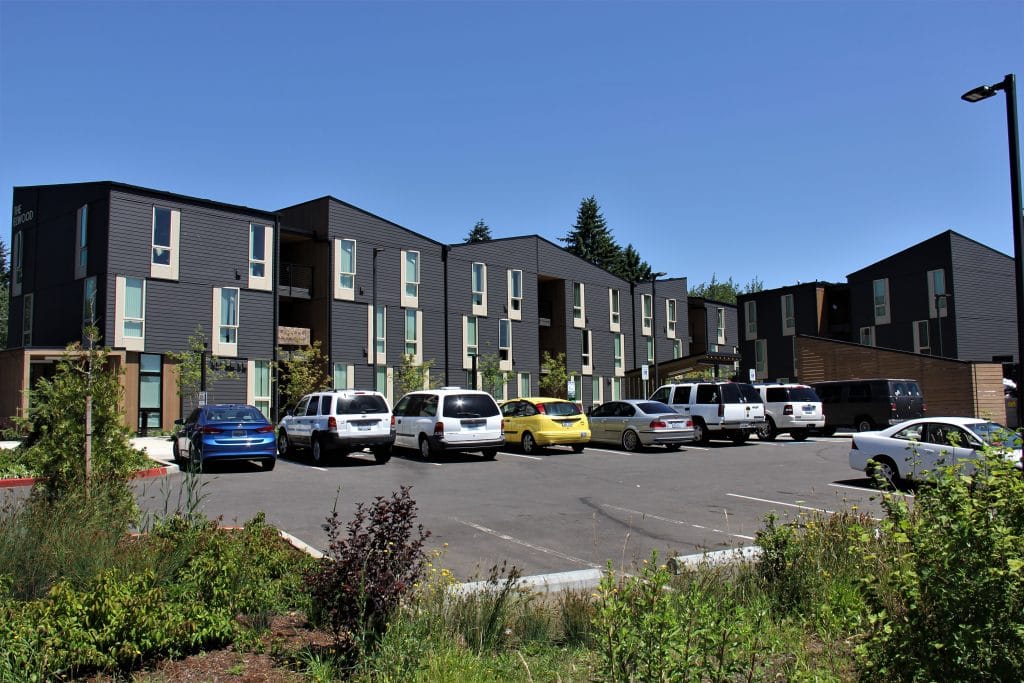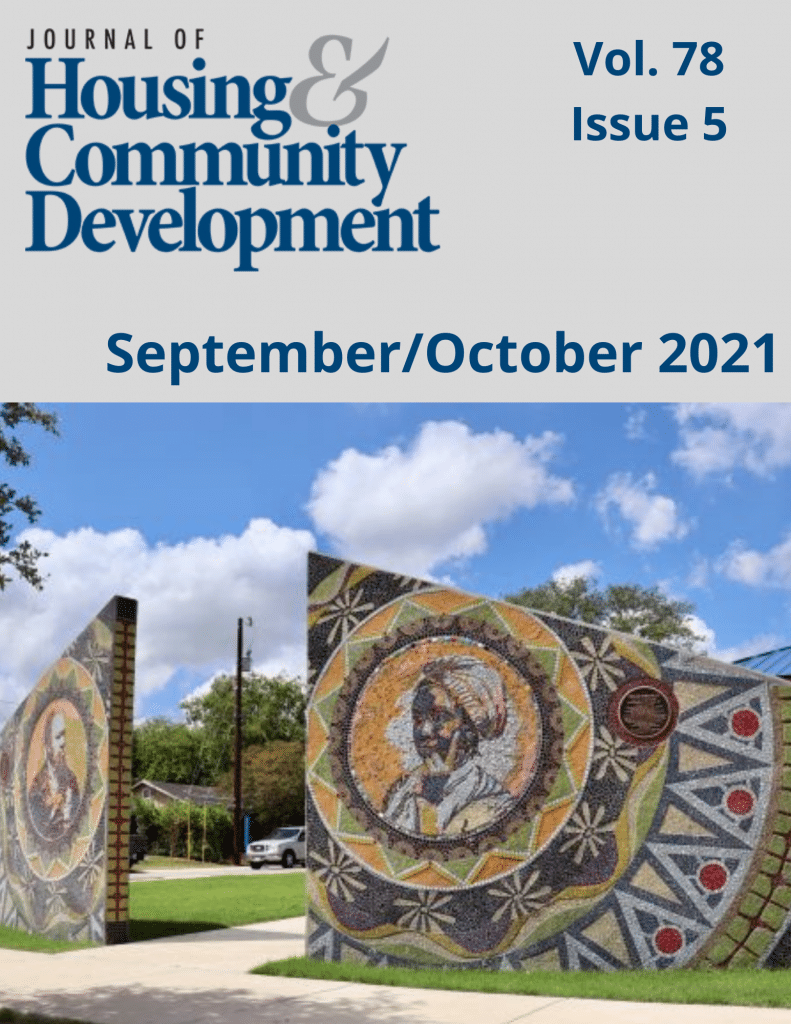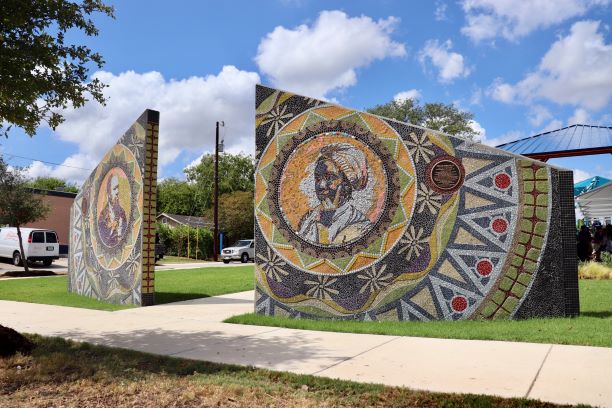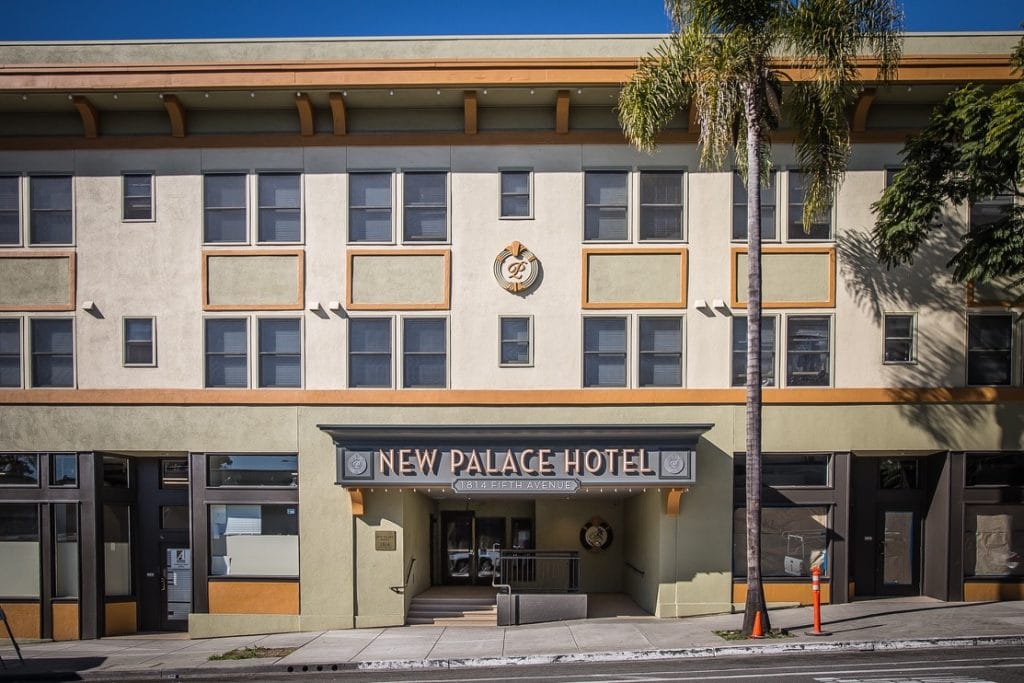Vancouver Housing Authority Provides Permanent Supportive Housing to Homeless

The Vancouver Housing Authority has long supported vulnerable, low-income tenants who struggle to keep their rental housing. The agency’s recent journey into permanent supportive housing, however, is gaining steam and spotlighting service supports that improve people’s quality of life.
By the end of 2022, Vancouver Housing Authority will more than double the number of supportive housing units it has, from 153 to 346. These units blend housing case management with services to help tenants stay stably housed.
In 2016, the housing authority and one of its nonprofit arms, Vancouver Affordable Housing, constructed Lincoln Place, its first supportive housing and housing first project built from the ground up. The 30-unit facility features a single, monitored entry to provide greater control around guests, additional sound insulation between walls, floor drains in bathrooms to prevent flooding and automatic shutoff timers on ovens.
Lincoln Place serves the most vulnerable people within the local homeless population. Each potential tenant is assessed to determine how vulnerable they are to dying on the street in the absence of a program to help them. Located on the west edge of downtown Vancouver, Lincoln Place had its ups and downs before finding its footing.
It takes three years to know a property, to know its acuity and level of need and the right mix of services it requires, according to Leah Halstead, asset and property management director at Vancouver Housing Authority. “You’re not going to get it right on opening day,” she said.
Similarly, for someone who’s exiting homelessness, it may take years to succeed through interventions and recovery programs.
“It’s about learning to recognize those smaller successes,” Halstead said.
And, redefining what success means and what it looks like, said Andy Silver, COO at Vancouver Housing Authority.
For some, success may mean “graduating” out of site-based supportive housing. For others, success means keeping their supportive housing and taking small steps toward addressing challenging behaviors.
These run the gamut from learning to use a bathroom appropriately to resolving conflict with neighbors and staff. If someone has lived in a homeless encampment for a while, they may be used to a culture of settling disputes by threatening others or displaying a knife.
VHA’s supportive housing communities have faced problems with tenants using racial slurs with other tenants and staff as a way to express negative feelings. Others may whittle drywall or take apart plumbing – both behaviors often related to methamphetamine use.
Simply learning to sleep inside one’s own apartment can be a major improvement for someone facing many challenges to remaining stably housed.
Halstead said there can also be a range of issues where residents are unable to set boundaries with guests and violate their lease agreements. In some situations, a guest may take over an apartment resulting in the tenant seeking help getting their apartment back.
Silver said vulnerable tenants are often taken advantage of and need to learn to, say, not loan money or let friends stay in their home.
“Sometimes ‘friends’ is a loose term,” Silver said.
VHA recently partnered with local homeless service provider Share, which received a grant to do outreach with the friends and family of people who are already in supportive housing. The intent is to get guests into a place of their own.
Since Lincoln Place opened, VHA has learned valuable lessons about service delivery. While services are put in place to help tenants stay stably housed, progress occurs at the pace of the tenant.
The housing authority found it needs to have in-house staff who understand the service model and can monitor performance and identify service gaps at each property. This led to the creation of VHA’s supportive services unit, which Silver oversees.
Silver said that while engagement in services is voluntary at Lincoln Place it doesn’t mean those services go away if a tenant initially refuses them. There are ways to reengage people and continue to offer resources when the tenant is ready.
Michelle Bittinat, Share’s housing stability and enrichment program director, said housing someone who has experienced extreme levels of trauma requires extra layers of wrap-around support.
“Some of the things we really focus on are meeting each person where they’re at and making it a low-barrier model,” Bittinat said. “If someone is not ready to engage in services that’s OK.”
This creates a challenge when it comes to paying for services. When somebody ops out of Medicaid-funded services, they are unenrolled and those options go away. VHA’s fix is to have a service coordinator who’s tied to the building but whose position is not funded by Medicaid. That way, if someone disengages from their health insurance programs the service coordinator can talk with them and get them on board later.
Providence Core is evaluating VHA supportive housing that uses the Medicaid benefit to see whether it reduces other Medicaid costs – showing the financial viability of permanent supportive housing. One of the principal philosophies behind permanent supportive housing are that it takes pressure off emergency response systems such as emergency rooms, paramedics, and police.
When it comes to the physical structure that supportive housing provides, Halstead learned buildings can sometimes be too technologically advanced. For instance, at Lincoln Place the housing authority put in a system that would not allow the heat to go on in a unit when the window was open. But the population housed is used to sleeping outdoors and so the windows are often open.
Sometimes simpler is better. Development Director Victor Caesar said it’s about finding the right balance of durability without looking or feeling institutional and spending more money on lifesaving components rather than aesthetics. Requests for reasonable accommodations are common as the population served tends to be older and more medically fragile. After a client moves out, patching walls, fixing electrical switches, and repainting are common repairs while replacing appliances due to damage can occur, too.
Also, not every tenant does well in Lincoln Place’s indoor communal areas and may prefer a garden-style apartment – the dominant style of apartments in Clark County, Wash. – so they can choose when and where to interact with others. The sense of community in site-based supportive housing can be beneficial for some, problematic for others.
The Elwood, completed in March of 2021, features 46 garden-style apartments that give residents more control over social interactions, but it still provides onsite staff and shared areas. Created in partnership with Housing Initiative LLC, The Elwood provides covered bike parking, onsite laundry, a community room, and outdoor courtyard with a community garden.
It uses the Medicaid benefit in addition to an in-house service coordinator so tenants can participate in services when they are ready.
A similar 46-unit development in east Vancouver, The Meridian, will be completed in June of 2022.
Silver credits the increase in supportive housing to the creation of the Housing Health Innovation Partnership in 2018. Led by the housing authority, the collaboration with county government and service agencies looks for ways to increase housing options for people with behavioral health issues and better integrate support services into housing. A county report detailed current housing options and gaps to be filled.
While Lincoln Place was still finding its bearings, the housing authority decided to use the property as a testing ground for ways to improve services and service delivery. It started by making new hires and moving property management in house; VHA previously contracted with a property management company to oversee Lincoln Place.
A partnership with CDM Caregiving Services helps tenants with housekeeping and meal prep. The creation of a harm reduction fund covers interventions to stabilize tenants. A case manager determined, for instance, a tenant was running their water all night long because they wanted background noise. The harm reduction fund paid for a sound machine. The fund also paid for a tablet to help a tenant with aphasia communicate.
A local physician’s weekly visits to the building help tenants take control of their health. Michelle Inman, a supportive housing property manager for Vancouver Housing Authority, said tenants who never go to the hospital or see a doctor – except when they end up in the ER – are making informed health decisions and turning around unhealthy behaviors.
She’s pleased to see Lincoln Place running smoothly and knows the additional supports and 24/7 staffing make a difference.
“None of it is super easy,” Inman said. “It is expensive to do it, but it’s also, I think, saving lives to do it.”
Bittinat said it’s not just about stabilizing people, it’s about reintegrating people into the community. Often those who were homeless and lived in encampments can feel lonely after moving into an apartment on their own. Residents may look forward to walking groups or resident meetings and events like holiday parties and barbecues.
“We’re not just focusing on people living dignified lives, we want them to live enriching fulfilling lives as well,” Bittinat said. “Yes, it’s an apartment building, but it’s also a community.”
Vancouver Housing Authority’s newer supportive housing facilities are still learning to adapt to the needs of residents.
Meriwether Place, a 30-unit community that opened in August 2018 in central Vancouver, is still in the “storming, norming and forming phase,” said Inman. Residents are referred through a Medicaid program called Foundational Community Supports. Some formerly-homeless residents fell out of services once they got housing so getting them requalified and reengaged in supports has been a big challenge.
She’s getting to know the myriad needs of the tenants. She’s also found when a lot of people with similar diagnoses are put together in a community it can exasperate behaviors. But it can also present an opportunity to offer supports to outweigh those challenges.
Inman said staff are approaching the challenges there with harm reduction in mind that is trauma-informed and focuses on tenants’ strengths.
And, true to the ethos of permanent supportive housing, “people get a thousand chances to work on their stuff and address things as they come up,” Inman said. “It has to be a pretty big reason for us to evict.”
That is where collaboration and communication is key among property management and service staff. Vancouver Housing Authority has found cross training beneficial so property management may, for instance, better understand chemical dependency or hoarding or problems with hygiene that can arise in supportive housing.
“It’s not about not having conflict or disagreement, but actually having property management that’s not just for the building but the tenants, too, and a service staff that’s not just for the tenants but the building, too,” Inman said.
Bittinat stressed the importance of the relationship between property management and service staff.
“We have the ability to be really effective when we’re a good team,” she said.
With each community there are lessons learned about how to improve the built environment and service delivery for residents. The population served makes a difference, as does the location; a downtown building feels much different from one on a quiet suburban street.
That trial and error and experiments and lessons at Meriwether Place, Lincoln Place and others in VHA’s portfolio are shaping its future supportive housing developments. One such development will be the first of its kind in the state.
Tenny Creek Assisted Living is designed as an assisted living facility for people exiting homelessness with behavioral health challenges. Located in the Hazel Dell area of Clark County, Wash., the building comprises 40 studio apartments and will feature a commercial kitchen and dining hall, hair salon, onsite nurse assistance, outdoor courtyard, secure bike parking, onsite laundry and 24/7 staffing along with activities and programming.
When designing Tenny Creek VHA staff toured several properties in the Portland, Ore. area to better understand operations and interactions with residents. Questions asked included ‘if you could redesign this building what would you do differently?’ and ‘what changes have you made to the operations of the development since opening?’ Caesar said he gleaned from those conversations that a combination of meeting spaces – both indoor and outdoor, large and small group – is beneficial. Also suggested was flexibility with meal services in terms of when and how meals are served.
Tenny Creek is slated to open in March of 2022.
Halstead there is a whole spectrum of models under the permanent supportive housing umbrella with different levels of staffing and types of services and methods of case management.
What works in one building and for one population may not work for another.
“Don’t assume every building is going to be the same just because it’s supportive housing,” Inman said.
Rhododendron Place opened in 2019 in Hazel Dell. It features 30 interior access studio apartments. Residents are referred by outpatient mental health provider Columbia River Mental Health Services. Located off the beaten path in a more residential setting, it doesn’t have as many issues with unauthorized visitors as other, more centrally-located properties do and doesn’t require 24-hour security. Residents still have the same onsite access to services. Part of the success of Rhododendron Place is that VHA planned for the worst case scenario in terms of staffing.
In contrast, Meriwether Place was originally understaffed due to a level of optimism that having services onsite would reduce property management needs. After the first year, it was clear there are differences between behavioral and mental health case management and housing case management. Now, Meriwether Place has 24/7 staffing and a case manager focused on helping residents maintain their housing. Halstead and Silver said housing authorities shouldn’t underestimate staffing needs and costs.
“One of the keys to supportive housing is you want everyone to have opted in, to want to work there,” Silver said.
Staff who are compassionate, resilient and have a sense of humor are critical to supportive housing.
“As soon as something gets done, it might get undone,” Inman said.
One of the benefits of working in supportive housing is watching residents succeed in big and small ways. A 29-year-old man living at Rhododendron Place said getting into permanent supportive housing saved his life.
After a hospital stay, he went to Columbia River Mental Health Services where a housing coordinator told him about Rhododendron Place. Although he applied to live there, he wasn’t too hopeful he would get in.
“When my name was chosen from the lottery, I started to get excited. I started working with an employment specialist and was able to work six hours a week at a pizza parlor,” the 29-year-old said.
That was 18-months ago. He’s since moved into housing and was recently promoted to assistant manager at the pizza parlor. Having saved enough money to buy a car, he no longer relies on public transit and can work different shifts; he loves his job and hasn’t missed a day of work.
“I feel hopeful for the first time that I’m going to be happy and not feel like a loser,” the resident said. “When I visit my family, it is to share good times and not ask for help.”
More Articles in this Issue
What Home Means to Me Calendars on Sale Now!
NAHRO is now offering pre-sales for the 2022 Housing America “What Home Means to Me”…Introducing the 2021 Cohort of NAHRO Merit and LDG Scholars
NAHRO and award-winning multi-family housing developer LDG Development are pleased to announce this year’s NAHRO-LDG Scholar cohort.…Wheatley Courts Brings New Park to San Antonio
The San Antonio Housing Authority (SAHA) won a 2020 Award of Excellence for Project Design…Sharswood Tower Is Remade, Bringing Promising Future
The Philadelphia Housing Authority won a 2020 Award of Excellence for Project Design for its modernized and rehabbed its Sharswood Tower.…Rancho Verde Provides Community to Farmworkers in Ventura
The Housing Authority of the City of San Buenaventura won a 2020 Award of Excellence…New Palace Hotel Puts Housing First
The San Diego Housing Commission (SDHC) won a 2020 Award of Excellence for Project Design for redeveloping a…




